To successfully organize a music gathering, start by defining your purpose and choosing the right venue that suits your theme. Set a realistic budget, prioritizing sound equipment and essentials, while creating a balanced guest list. Promote the event effectively on social media and plan a schedule that keeps guests engaged. Don't forget to engage the community by inviting local artists and businesses. Make certain performers are well-prepared through rehearsals and sound checks. Finally, collect feedback after the event to improve future gatherings. There's so much more to reflect upon, so keep going to uncover additional tips!
Key Takeaways
- Define the event's purpose and theme to align with the interests of your target audience.
- Choose an accessible venue with good acoustics, ensuring it accommodates your expected guest capacity.
- Create a budget that prioritizes essential items like sound equipment while allowing for unexpected expenses.
- Promote the event through social media and local influencers to maximize visibility and engagement.
- Collect post-event feedback to identify strengths and areas for improvement, enhancing future gatherings.
Define Your Purpose
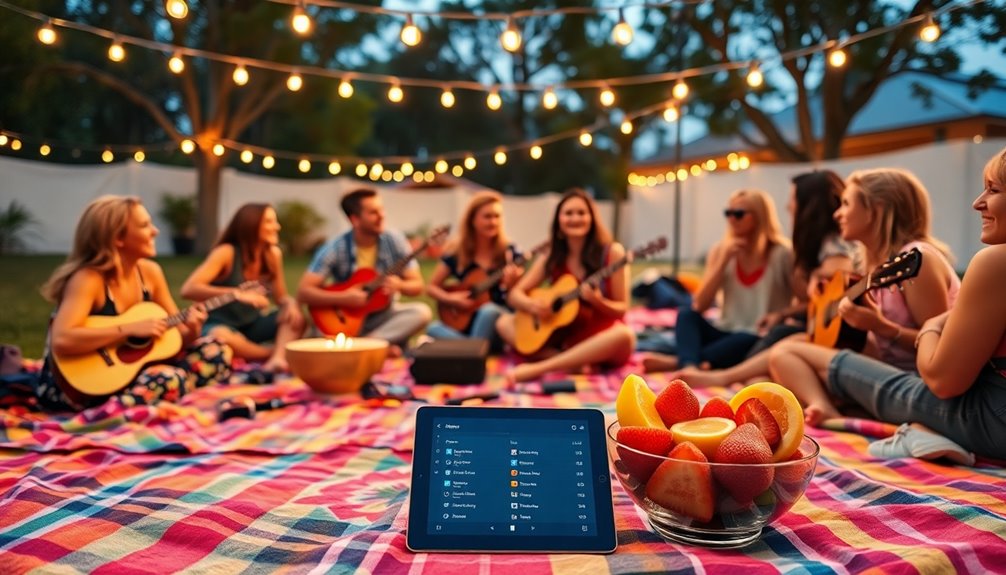
When planning a music gathering, the first step is to define your purpose. What do you want to achieve with this event? Is it to bring people together for a night of fun, showcase local talent, or support a charitable cause? Clearly identifying your purpose will guide every decision you make from there.
Next, think about your event theme. Whether it's a cozy acoustic night in a backyard or an electrifying outdoor festival, your theme sets the tone and atmosphere. It should resonate with your target audience, drawing them in and making them feel connected to the experience.
Consider what kind of music they love and how you can create an environment that reflects those preferences.
When you know your target audience, you can tailor the gathering to their interests. This means understanding their age, music tastes, and social habits. Are they looking for a casual hangout with friends, or an opportunity to discover new artists? Additionally, incorporating mental preparation techniques can enhance performers' confidence and contribute positively to the overall atmosphere of your event.
Choose the Right Venue
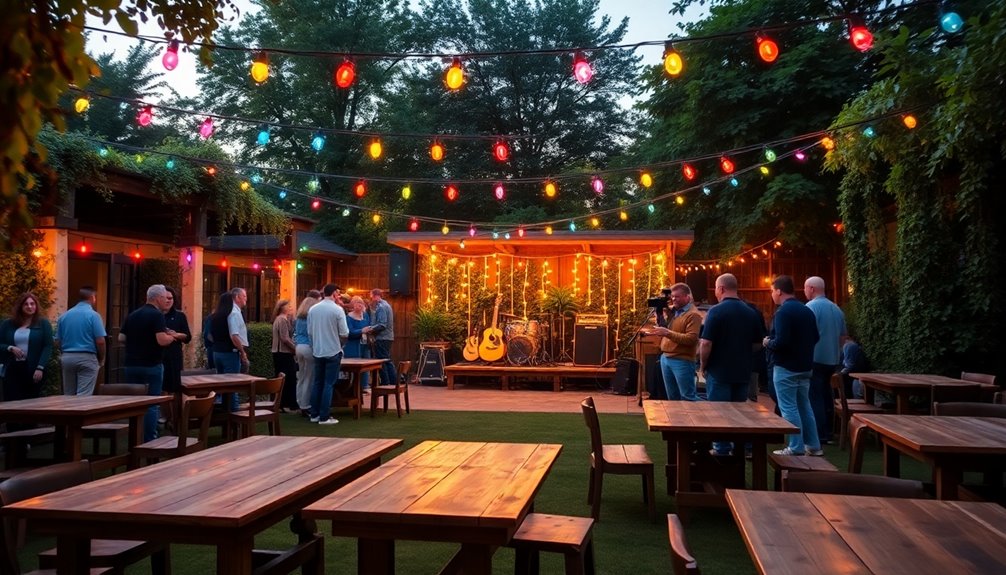
Selecting the right venue can make or break your music gathering, so it's vital to take into account various factors before settling on a location.
Start by considering the venue capacity. You want enough space for your guests to feel comfortable and not crammed, yet intimate enough to foster a sense of connection. Think about the vibe you want to create; a cozy café may suit an acoustic set, while a larger hall might be perfect for a full band.
Next, consider location accessibility. Is the venue easy to find? Are there public transport options nearby? Accessibility plays a significant role in guaranteeing your guests can arrive without hassle. You want everyone to feel included and able to join in the fun. If your gathering is in a remote area, it might deter some attendees, so aim for a location that invites everyone to participate.
Don't forget to think about the atmosphere. Does the venue have good acoustics? Is there enough space for a stage or performance area? Visualize how your gathering will unfold in the space, and confirm it aligns with your purpose. Additionally, consider incorporating performance-enhancing tools that can optimize the overall experience for both performers and attendees.
Lastly, check on amenities like restrooms, parking facilities, and even food options if necessary. All these factors contribute to creating a welcoming environment where everyone feels they belong.
Set a Budget
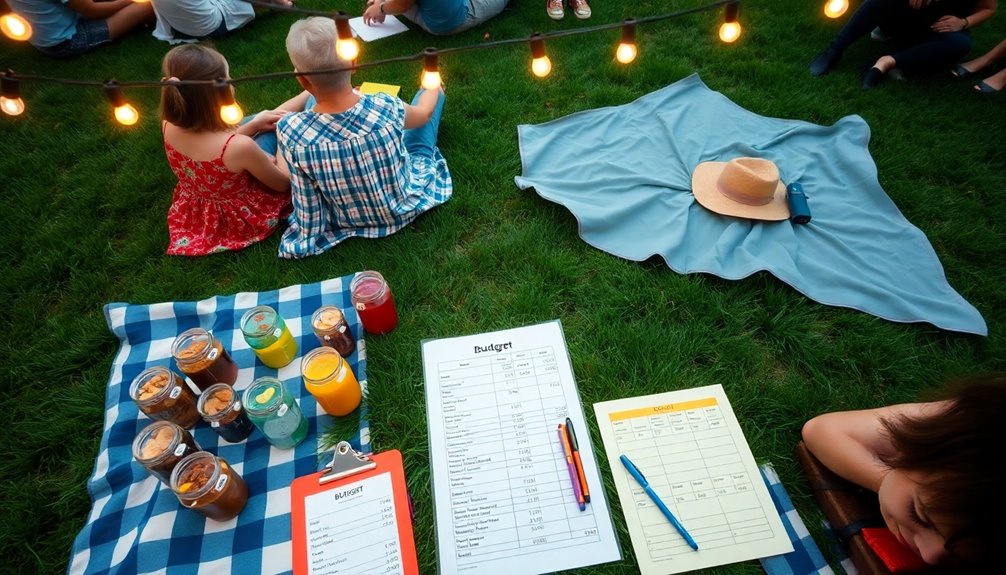
After securing the perfect venue, it's time to tackle your budget. Setting a budget for your music gathering is an essential step that guarantees you can create an unforgettable experience without overspending.
Start by outlining your cost considerations. Think about all the elements that will contribute to the event's success, such as equipment rentals, sound systems, and lighting. Don't forget about essentials like permits or insurance if required.
Next, focus on budget allocation. Allocate specific amounts for each category based on priority. For instance, if live performances are your main attraction, consider investing more in quality sound equipment and artist fees. On the other hand, if you're aiming for a cozy, intimate vibe, you might want to spend more on décor and a comfortable seating arrangement.
Keep in mind that unexpected expenses can arise, so it's wise to set aside a small contingency fund. This gives you peace of mind and flexibility in case something doesn't go as planned.
Finally, stay organized. Create a spreadsheet or use budgeting apps to track your expenses as they come in. This will help you visualize your spending and identify areas where you might need to adjust. Additionally, consider including the cost of quality instruments in your budget to ensure performers have the best equipment for their sets.
Create a Guest List
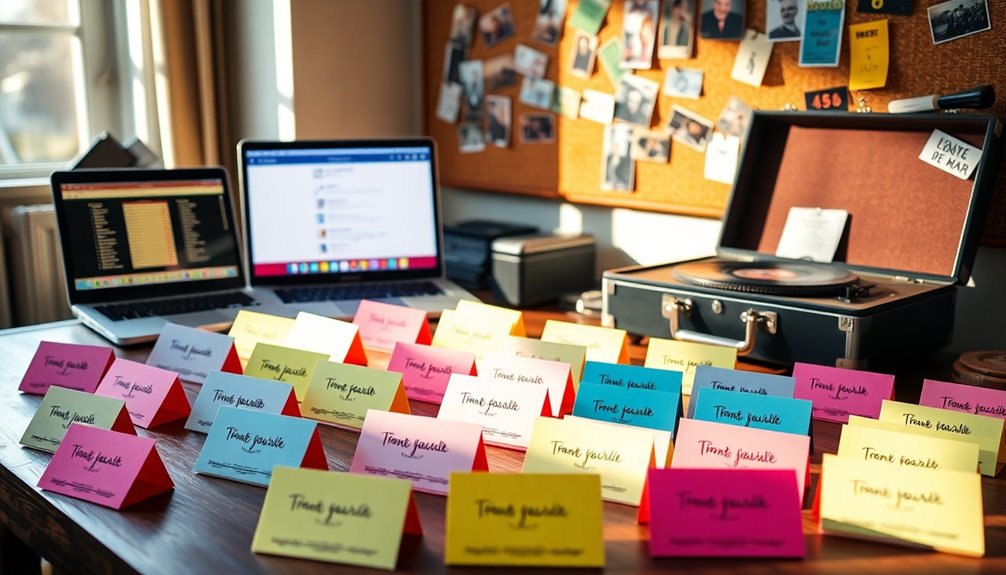
Creating a guest list is a significant step in organizing your music gathering, as it shapes the atmosphere and energy of the event. Start by considering who you want to invite. Your guest preferences play an essential role in making certain everyone feels included and excited. Think about your friends, fellow music lovers, and even acquaintances who share a passion for the genre you'll be featuring.
Once you've brainstormed potential guests, it's time to refine your list. Aim for a balance between familiar faces and new connections. This mix not only fosters a sense of belonging but also opens the door for new friendships to blossom. You might even want to ask a few guests for their input on who they'd like to bring along, which enhances the feeling of community.
Next, pay close attention to invite etiquette. Sending out invitations well in advance shows respect for your guests' time and allows them to mark their calendars. Whether you choose digital invites or handwritten notes, make sure they reflect the vibe of your gathering. Include important details like the date, time, location, and any special instructions, such as dressing for a particular theme or bringing their favorite instrument.
Additionally, consider inviting musicians who play beginner-friendly instruments, as this can create an inclusive environment for everyone to participate and enjoy making music together. Lastly, don't forget to follow up with your guests a week before the event. This simple gesture reinforces your excitement and helps confirm everyone is on board.
With a thoughtfully curated guest list, your music gathering is bound to be a hit!
Plan the Schedule
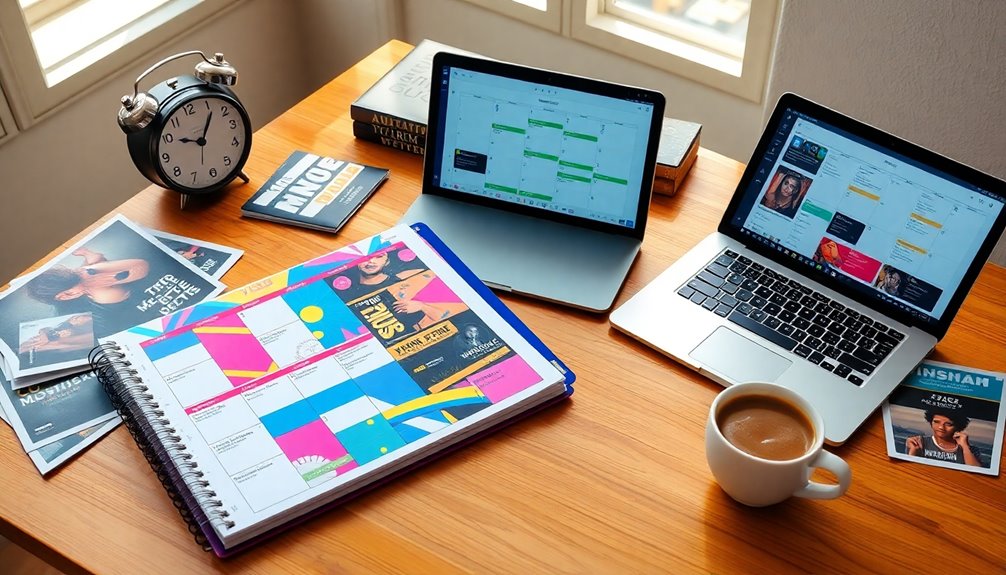
Planning the schedule for your music gathering is vital to guarantee everything flows smoothly and keeps your guests engaged. Start by determining the duration of the event and breaking it down into manageable segments. Consider how long each performance or activity will last. This helps you with effective time management, ensuring that every act fits seamlessly into your gathering.
Next, think about the performance flow. You want to create an enchanting atmosphere, so mix different styles and tempos throughout the event. For instance, if you have an energetic band performing, follow it with a mellow acoustic session to give your guests a moment to relax. This variety keeps everyone interested and involved.
It's also important to include breaks in your schedule. Whether it's a short intermission for refreshments or a chance for guests to mingle, these pauses enhance the overall experience. Schedule these breaks strategically; they can serve as natural shifts between performances.
Finally, communicate your schedule clearly to your guests. Share a printed agenda or a digital version that they can refer to throughout the event. This transparency not only helps them anticipate what's next but also fosters a sense of belonging, as everyone feels informed and included in the gathering's flow. Additionally, consider incorporating essential flute practice tools into your event, as they can enhance the overall experience for musicians and audience alike.
Arrange Equipment and Supplies
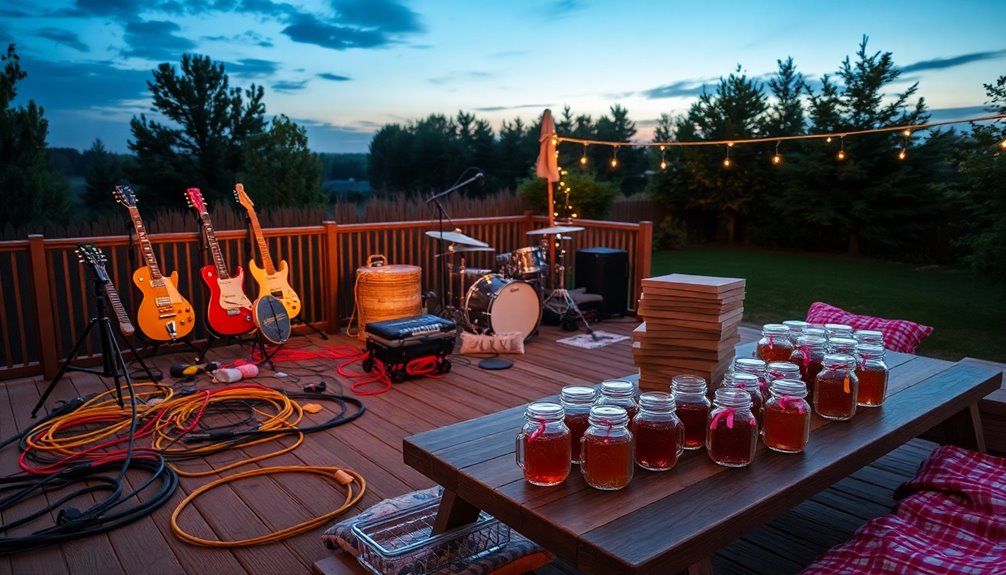
When organizing a music gathering, arranging equipment and supplies is essential to guarantee everything runs smoothly. It's not just about the music; it's about creating an atmosphere where everyone feels connected and engaged.
Start by evaluating your sound setup needs. Determine how many performers will be playing and what type of instruments they'll use. This will help you figure out the right mix of microphones, speakers, and mixing boards to make sure everyone sounds their best.
Next, consider equipment rental options. If you don't have access to all the necessary gear, renting can be a cost-effective solution. Reach out to local audio and lighting companies to find reliable services. They often provide packages specifically designed for music gatherings. Ask about delivery and setup, as this can save you a lot of time and stress on the event day.
Don't forget about essential supplies like extension cords, stands, and cables. Create a checklist to ensure you have everything covered, from the smallest items to the large speakers. Organize these supplies in labeled boxes to make setup easier and more efficient.
Lastly, consider the comfort of your guests. If your gathering is outdoors, think about providing tents, seating, and shade. A well-thought-out arrangement not only enhances the sound quality but also fosters a welcoming environment where everyone can enjoy the music together. Additionally, consider incorporating regular maintenance of sound equipment to ensure optimal performance during the event.
Promote the Event
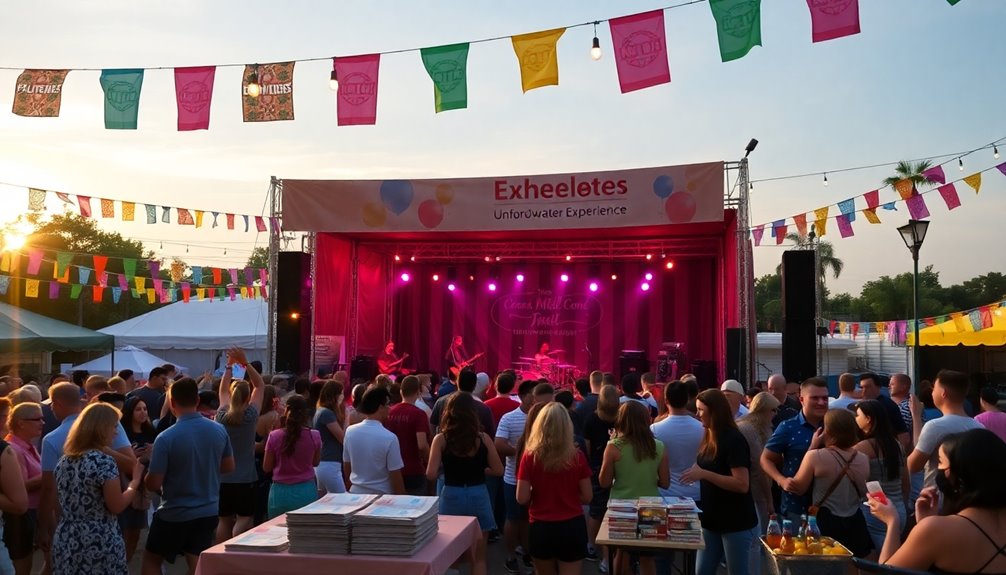
To guarantee your music gathering attracts the right crowd, effective promotion is key. Start by leveraging social media platforms like Facebook, Instagram, and Twitter. Create event pages and share engaging posts that highlight your gathering's unique features—whether it's the lineup, venue, or any special activities. Use eye-catching visuals and compelling captions to draw attention. Encourage your friends and followers to share your posts to widen your reach.
Next, develop promotional materials that reflect the vibe of your event. Design posters, flyers, and digital graphics that include essential details like date, time, location, and ticket information. Distribute these materials in local coffee shops, music stores, and community centers where your target audience frequents.
Don't forget to include QR codes that link directly to your event page, making it easy for interested attendees to learn more and RSVP.
Consider reaching out to local influencers or music bloggers who can help spread the word. A shout-out from someone with a following can create buzz and encourage a sense of community around your event. Additionally, consider creating an event hashtag to foster a sense of belonging and connection among attendees.
Finally, keep the excitement alive as the date approaches by sharing countdown posts, sneak peeks, and reminders. This not only builds anticipation but also keeps your gathering top-of-mind for potential attendees. Incorporating engaging melodies into your event can also enhance the overall atmosphere and attract a larger audience.
With the right promotion strategy, you'll cultivate an enthusiastic crowd ready to enjoy your music gathering.
Engage the Community
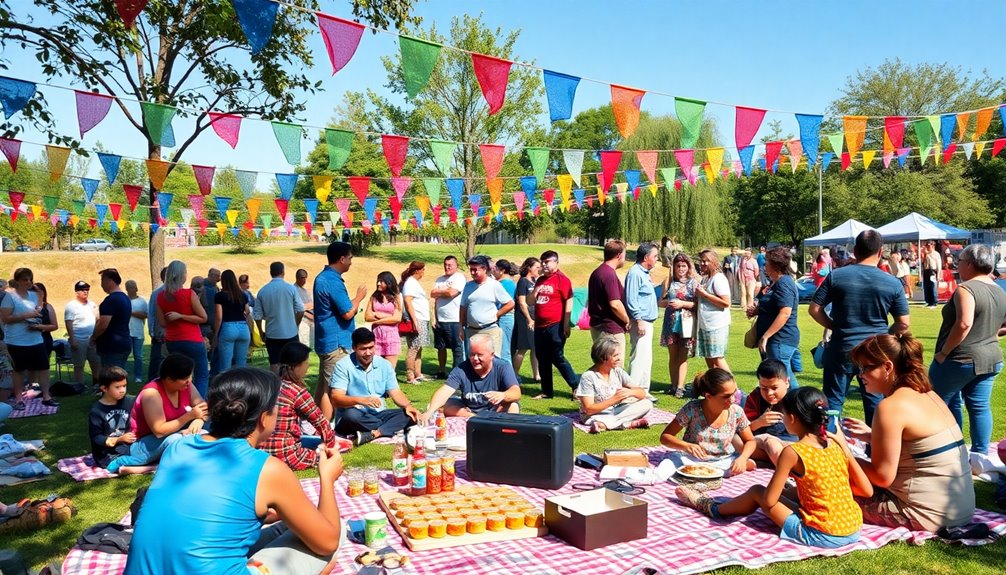
Engaging the community is an essential next step after promoting your music gathering. You want to create an atmosphere where everyone feels welcome and involved. One effective way to achieve this is through community participation and local collaboration. When you integrate local artists, businesses, and organizations, you not only enhance the event but also foster a sense of belonging among attendees. Additionally, creating performance opportunities allows local musicians to showcase their talent and connect with a wider audience.
Here's a quick look at how you can involve your community:
| Action | Benefit | Local Collaboration |
|---|---|---|
| Invite local artists | Showcases regional talent | Partner with local musicians |
| Collaborate with businesses | Builds community support | Sponsor from local shops |
| Create volunteer opportunities | Engages residents | Recruit from community groups |
Prepare for Performances
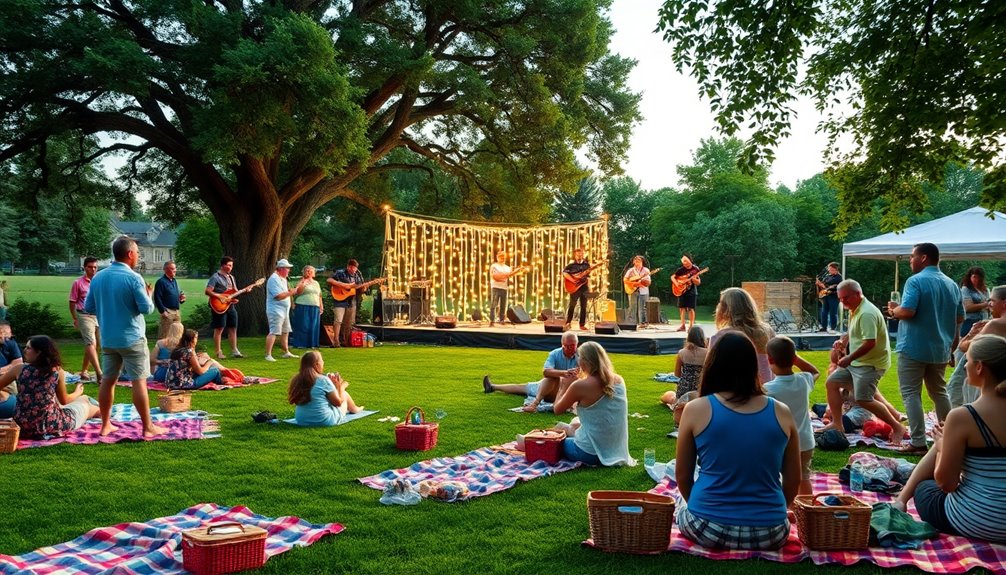
Preparing for performances is essential to the success of your music gathering, and it often requires careful planning and attention to detail. Start by creating a clear rehearsal schedule for all performers. This guarantees everyone knows when and where they'll practice, fostering a sense of belonging among the group. It's critical that musicians feel confident and prepared, so encourage them to communicate if they need additional time or support.
Next, prioritize sound checks. These are important for making sure that everything sounds just right on the big day. Schedule sound checks well in advance, allowing time for adjustments. Make sure each performer has a chance to test their instruments and microphones. This not only helps to avoid technical issues but also builds camaraderie as everyone works together to create a harmonious experience.
As you finalize the details, keep an open line of communication with your performers. Share the rehearsal schedule and sound check times, and encourage them to express any concerns or preferences. This collaborative approach helps everyone feel valued and included.
Finally, visualize the flow of the performance. Think about the shifts between acts and how you can enhance the overall experience for your audience. A well-prepared performance reflects the effort and passion of all involved, creating an unforgettable gathering that resonates with everyone. Additionally, encourage performers to incorporate mindful breathing to help center their focus and relax before going on stage.
Gather Feedback After Event
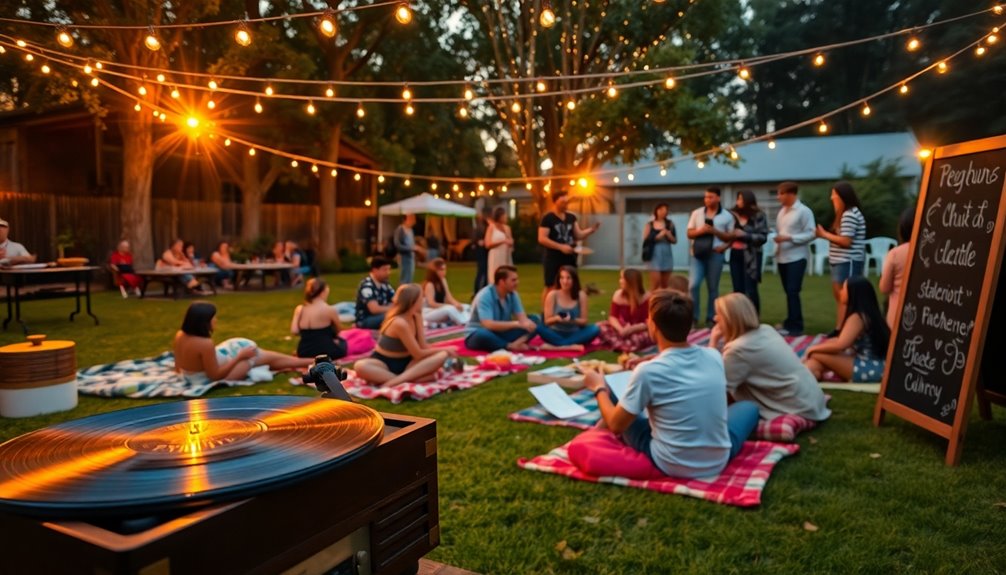
Once the music gathering wraps up, gathering feedback is essential for understanding what resonated with your audience and performers alike. Engaging your attendees in this process not only helps you improve future events but also fosters a sense of community and belonging. You want everyone to feel their voice matters.
Start by creating a post event survey. Keep it concise yet thorough, focusing on aspects like venue, lineup, and overall experience. Ask open-ended questions to encourage detailed responses. For example, "What did you enjoy most about the gathering?" or "How can we improve for next time?" This invites your audience to share their thoughts and feelings, making them feel integral to the event's success.
Distributing feedback forms during the event can also be effective. Consider placing them on tables or handing them out as attendees arrive. Encourage your guests to fill them out while they reflect on their experiences, perhaps offering a small incentive like a discount on future events. This makes it easy for them to share their insights.
After collecting responses, take the time to analyze the feedback. Look for patterns that highlight what worked well and what didn't. Share a summary of the findings with your community, showing that you value their input and are committed to evolving. Additionally, consider creating a post event survey that includes specific questions about aspects such as venue choice and performer selection to gather targeted feedback.
Frequently Asked Questions
How Can I Handle Unexpected Weather Changes During the Event?
To handle unexpected weather changes, you'll want a solid weather contingency plan in place.
Start by checking forecasts leading up to your event and prepare for both sun and rain. Bring canopies, tents, or umbrellas for shade and shelter.
Make sure your outdoor preparations include sturdy ground coverings to prevent mud and slipping.
Communicate with your guests about potential weather challenges, so they feel informed and included, creating a sense of belonging despite the unpredictability.
What Should I Do if a Performer Cancels Last Minute?
Imagine the excitement of your event, suddenly dimmed by a last-minute cancellation.
Don't panic! Reach out to your network for backup performers who can step in quickly. Often, passionate musicians are enthusiastic for opportunities and can deliver an unforgettable experience.
Have a list of potential replacements ready, so you're not scrambling.
Keep the atmosphere lively and connected—your audience will appreciate the effort, and you'll create a memorable moment, despite the hiccup!
How Can I Ensure Safety and Security for Attendees?
To guarantee safety and security for attendees, you need a solid plan.
Start by implementing crowd control measures, like designated entry and exit points.
Develop clear emergency plans, so everyone knows what to do in case of an incident.
Train your staff on these procedures, and keep communication lines open.
Encourage attendees to look out for one another, creating a sense of community.
With preparation and vigilance, you'll foster a secure environment for everyone.
What Is the Best Way to Manage Noise Levels?
Managing noise levels can make or break an event's atmosphere. It's essential to create an inviting space where everyone feels comfortable.
Consider using sound barriers to minimize external noise and keep the vibe cozy. Implement volume control measures, like designated quiet areas, where attendees can recharge.
How Can I Accommodate Guests With Disabilities?
To accommodate guests with disabilities, you'll want to prioritize accessibility features throughout your venue.
Make certain entrances are wheelchair-friendly and restrooms are equipped for all needs.
Consider transportation options, like designated parking spaces or shuttle services, to make travel easier.
You could also provide seating arrangements that allow for comfort and movement.
Conclusion
By defining your purpose, choosing the right venue, and setting a budget, you lay the groundwork for a successful music gathering. By curating a guest list, planning the schedule, and promoting the event, you create excitement and engagement. By involving the community, preparing for performances, and gathering feedback afterward, you foster connection and growth. So, embrace these tips, stay organized, and watch your music gathering transform into a memorable experience that resonates with everyone involved.






